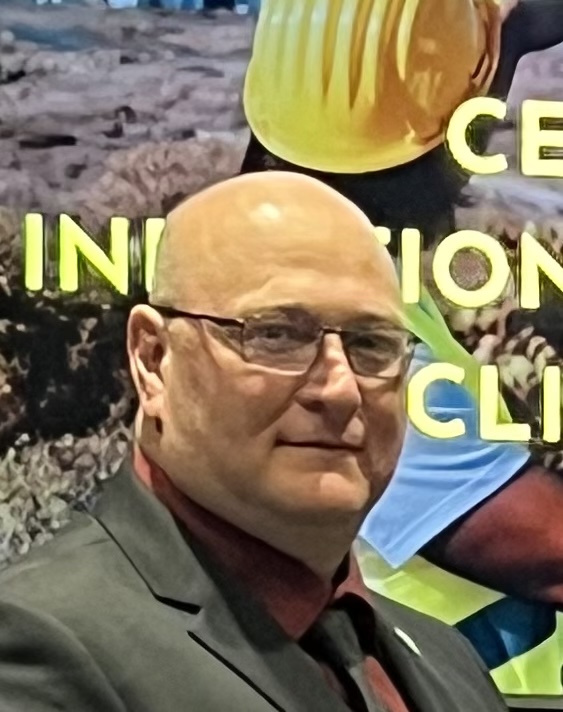Jeff W. lives in Illinois and has been a member of the International Brotherhood of Electrical Workers (IBEW) Local 146 for 27 years. He’s an inside journeyman wireman and a mentor to apprentices. Jeff currently works on a solar farm with 300 other people.
What’s it like working as a wireman?
If it’s got a wire, I want to be the guy you want to call. We do anything from house working, heavy industrial wiring, sound systems, life safety, fire alarm systems, security systems, and underground utilities, we help with those. It’s a pretty broad spectrum. The IBEW’s given me a lot of opportunities between working in a commercial field, nuclear powerhouses, coal powerhouses, refineries, oil refineries, and now solar. [These jobs] allow you to see a lot of different things, that’s what I like.
How did you get into the industry?
I didn’t even know what the IBEW was [growing up], no one talked about it. I just kind of fell into it. I went to a junior college right after high school and it didn’t take long for me to figure out college really wasn’t my thing. I went through an [apprenticeship] application process and luckily, I got accepted on my first try. That was in 1996, 27 years ago.
What’s your favorite type of project to work on?
I like to teach. I like to be on the jobs where you have an apprentice and you have time to teach what you know. That’s how I was taught. You learn from your predecessors. What I like the best is to teach the future generation. I really don’t have a favorite [type of project], I like all of them because they offer so many different opportunities and challenges. I love it all.
What’s it like mentoring apprentices?
With the apprentices, they’ve got to have so many on-the-job hours. It’s my job as the journey[man] to help train you. A lot of the electricians I know are hands-on learners, which I was. With our schooling, it’s all classroom. I have the opportunity to help guide [apprentices] into doing the right things, keep away from the wrong things, and not make the same errors that I made in the field. That’s what a job as a journeyman is in my mind. It’s part of our responsibility to each other and the IBEW. It’s a pretty big honor. I get a lot of pride in seeing a brand new first-year apprentice succeed [to making it to] a journeyman and carrying on what we do.
Why is being a union member important to you?
It’s a brotherhood. The IBEW has allowed me to meet people from all over this country. When you have a personal trauma in your life, it’s nice to know that I can reach out to anybody in my contacts who would instantly help any way they can. When my daughters turned 16, the first thing I did was put a union sticker in their car windows. I knew if they had car trouble along the road, and an IBEW member saw that, they would stop. Because I’ve done it. My son is a third-year IBEW apprentice in Indiana and seeing my son go down the road I have was a very proud moment in my life. We have a strong community. And we’re very welcoming into it.
What’s something that you wish that maybe people in general understood about unions?
We have our livable wage, our retirement and benefit package, and the opportunities that are provided to union members to go further in their career. I think being a union member opens so many more avenues, being an educated craftsman. Being a union member allows you to make your own choices and not just financial. There’s a lot more reward in having pride in your job, being union. It’s just great.
In December of 2023, you spoke at a meeting hosted by the Climate Jobs Taskforce and the House Sustainable Energy and Environment Coalition SEEC in Washington, D.C. Why was it important for you to speak to elected officials about the importance of building our clean energy future using union labor?
When you start building these [clean energy] projects with union labor, your membership instantly rises and it brings everyone up in the community to a higher livable wage. You want to talk about boosting the economy? You give a hundred more families a higher livable wage. The housing market starts moving, people are buying cars, and it gives that community a lot more pride when you have more people earning more money. They put it back in the community. They’re volunteering more. They’re getting involved in the community with outreach programs. When you have a union labor project like the one I’m on, they want to hire another 80 people here this spring. That’s not just 80 people who’re affected by these projects, that’s 80 families that’s affected. That’s probably 300 to 400 people that this one project affects, and that could turn their whole life around. Building these projects with union labor, it sustains that community, it keeps it vibrant.
Where do you hope to see the clean energy sector in the future?
If you look where we were five years ago today, it’s unreal the advancements we’ve made. We are moving away from coal. Solar and wind, those are going to be sustainable energy sources. We are losing coal mining jobs, but if you look back at the history of this country, in every technological advancement we’ve lost jobs. But we’ve always created educational opportunities to retrain and reeducate and find jobs for those lost. In my lifetime we could have enough energy to where no one pays for electricity. We have the technology, we just gotta move in that direction. I think everyone should have free power. That’s what I would love to see in the next ten years.
What motivates you personally to work towards a clean energy future?
I’ve worked in a coal powerhouse. They’re dirty. I breathed all that stuff into my lungs. The solar fields, the wind farms, it’s a safer work environment. These clean energy projects are better for the [natural] environment. Green energy is sustainable and we don’t have emissions that pollute the air. The stuff I’m installing isn’t for me. It’s for the next person, for the greater good.
This interview has been condensed and edited for content and clarity.

